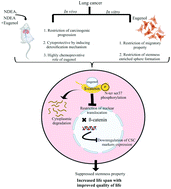Eugenol emerges as an elixir by targeting β-catenin, the central cancer stem cell regulator in lung carcinogenesis: an in vivo and in vitro rationale
Abstract
According to population-based studies, lung cancer has become one of the leading causes of death globally in males and is also rising in females at an alarming rate. The aim of this study was to exploit the inherent properties of eugenol to restrict the growth of cancer cells in a tobacco-related human carcinogen NDEA-induced lung carcinogenesis model in vivo as a chemopreventive agent. More precisely, by utilizing its abundance in nature, eugenol (a component of clove) was utilized to establish the molecular mechanism of chemoprevention in the NDEA-induced mouse lung carcinogenesis model in a substantial cost-effective manner and was validated in the A549 human lung cancer cell line. Our study especially targeted the tiny, drug-resistant, and most virulent subpopulation of cancer cells called CSCs by targeting their regulator molecule β-catenin. The non-toxic dosage of eugenol was shown to enhance apoptosis, simultaneously suppressing cell proliferation in the lung tissue of carcinogen-treated mice without affecting the normal mice. Combining cellular apoptosis and proliferation, eugenol showed an exceptional chemopreventive potential in this lung carcinogenesis model. Importantly, eugenol strongly restricted the lung carcinoma in the mild dysplastic stage as a chemopreventive agent. The molecular analysis remarkably depicted the restriction of β-catenin nuclear transportation. The minimized total β-catenin pool and induced N-terminal Ser37 phosphorylation form after eugenol treatment resulted in its cytoplasmic degradation. Consequently, CSC markers such as CD44, Oct4, EpCAM, and Notcht1, whose expression is dependent on β-catenin decreased significantly, as proven by IHC, ICC, and WB analysis both in vivo and in vitro. The in vitro secondary sphere formation assay also proved the remarkably repressed CSC population, and hence the virulence. In another way, eugenol was proven to significantly enhance the degradation of β-catenin when treated with the CK1α inhibitor D4476 in vitro by Western blot. CK1α in the Wnt/β-catenin pathway plays a crucial role for tagging with the N-terminal Ser45 phosphorylation of β-catenin, which ultimately opens a position for the decisive phosphorylation by GSK3β at the Ser37 residue to take place. Thus, the conclusive extermination of CSCs achieved that was associated with recurrence due to treatment failure. That can help to achieve a longer and better quality of life in a natural, economical way.

- This article is part of the themed collection: Food & Function Recent HOT articles


 Please wait while we load your content...
Please wait while we load your content...